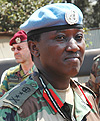The Deputy Commander of the Darfur force has said that the equipment donated by the United States of America to Rwanda Defence Force (RDF) to empower the force’s peacekeeping interventions is part of the solutions to the United Nations/African Union Mission to Darfur (UNAMID) challenges.


The Deputy Commander of the Darfur force has said that the equipment donated by the United States of America to Rwanda Defence Force (RDF) to empower the force’s peacekeeping interventions is part of the solutions to the United Nations/African Union Mission to Darfur (UNAMID) challenges.
"U.S is among countries recognised as ‘Friends of UNAMID’. The equipment donated by its government will contribute greatly in solving some of the shortage,” Major General Karenzi Karake told The New Times Thursday in an exclusive interview in Kacyiru.
"As more and more equipment come in, the more the mission’s effectiveness and capability is enhanced, which makes it possible for UNAMID to execute its mandate even more,” Karake pointed out.
Karake said that a team at the UN headquarters in New York will soon pay a pre-deployment visit to a number of countries including Rwanda, and the team would determine the countries’ readiness for deployment.
He said that the equipment is part of what they require though it might not fully address the force’s requirements, but it helps in solving part of it.
RDF Wednesday received equipment worth US$20 million from the United States (US) government to empower the army’s peacekeeping interventions.
UNAMID challenges
"There has been a slow but incremental buildup although numbers of the force are still much lower than what we had expected to have by this time because the mission is coming to one year now,” Karake explained. He said that they expected to have 26,000 people but up to now only have half of the projected force levels.
"It is equally so with the equipment we had anticipated, and that of course, explains part of the challenges we are faced with,” he noted.
He continued to say that there is a gradual increment of the force but more was needed in terms of labour force and equipment. He cited attack (military) helicopters, transport helicopters and other engineering equipment they badly needed.
Karake however, hopeful that things would improve saying that the UN Security Council had renewed UNAMID’s mandate for another year.
He also pointed out that recently Ethiopian engineers arrived to beef up the force following some from Egypt and China.
He also that having parties on the ground who were not willing to pursue a political solution as another challenge facing the mission.
During the first peace talks, there were only three groups which were party to the agreement, but today there are about 30 political groupings most of which did not sign the peace agreement.
"This demonstrates how hard it is to reach consensus, even for those of us trying to help them reach a political consensus. In short, there is no peace to keep,” he said.
He also said that the conflict in Darfur has many dimensions; national, regional and international, which have to be addressed if peace is to come to Darfur.
"There are continuous accusations and counteraccusations, not just within the warring parties but also countries in the region and beyond,” Karake explained.
Darfur population expectations
According to the General, the population in Darfur is friendly to the peacekeepers and yearning for peace.
"What is challenging for the peacekeepers, are the very high expectations from the population that have to be managed and addressed,” he pointed out.
The old and young who have abandoned their homes and school hoped to get back to their normal lives when UNAMID arrived, and have up to now not been able to do their businesses as expected.
"Regardless of the huge challenge of meeting all expectations of the people of Darfur, their relationship with the peacekeepers is excellent, said General Karake.
"It has to be understood though, that the solution to the Darfur crisis lies first and foremost on the shoulders of the people of Sudan. The solution has to be a win-win political one,” he stressed.
Ends


